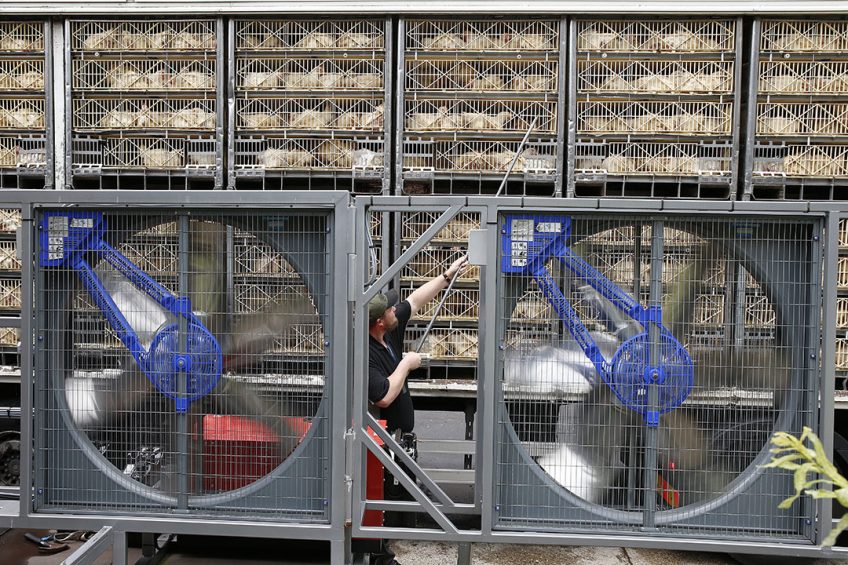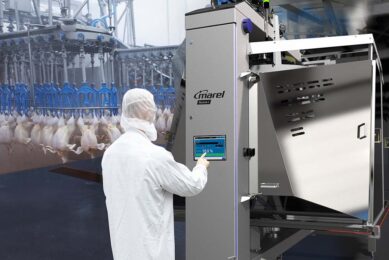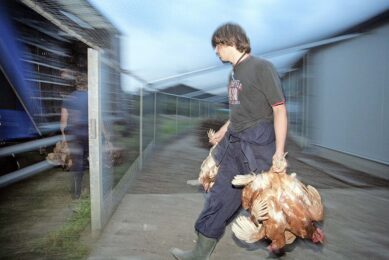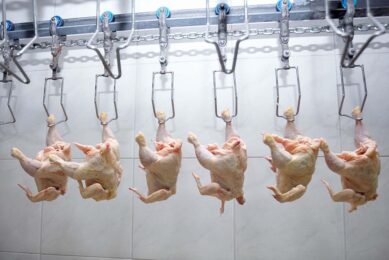Pre-slaughter measures impact further processing

Water-spraying together with forced ventilation during holding improves meat quality after processing.
Research shows that the water holding capacity, impedance and microstructure of breast meat from summer-transported broiler chickens is better if heat stress during holding is reduced.
Practice of freezing/thawing poultry meat
To prolong shelf life and retain the quality of meat, freezing is the most important and widely used preservation method. During thawing, however, several changes in the meat occur, freeze-thaw water loss being one of them. Poor water retention is influenced by the type of meat and the freezing rate.
Tissue damage
As tissue damage is due to the formation of extracellular ice crystals, structural changes were measured by impedance characteristics using microscopic structure analysis. Often the effects of further processing procedures, such as portioning and vacuum-tumbling, are studied in relation to marinade uptake and retention, as well as cooking loss. The effect of pre-slaughter measures has not so far been studied in relation to fresh meat quality after freezing and thawing.
 Effect of transport distance and climate on broilers
Effect of transport distance and climate on broilers
Researchers looked in to the effect of transport distance on commercial broiler chickens at distances of 15 km to 90 km.
Heat stress
Heat stress is just one of the factors that may lead to a deterioration in meat quality, including pH, cooking loss and decreasing water holding capacity. Chronic heat stress results in skeletal muscle damage and reduced protein functionality, resulting in decreased yield after further processing.
Water spray cooling and forced ventilation
Heat stress in the live bird is a broiler welfare and economic issue and can be controlled by using water sprays and forced ventilation during the holding period at the slaughterhouse after transport, a practice applied in many countries during hot summer conditions.
Practice tested in lab in relation to freezing and thawing
In a laboratory facility this practice was tested to determine its effect on breast meat quality before and after subsequent freezing and thawing. Products treated with water spraying, forced ventilation, frozen and thawed, had the highest pH and the lowest L* value, drip and cooking loss.
These products compared to the fresh product, the microscopic structure showed less water loss and less tissue damage as measured by the impedance method. The water spray and forced ventilation method applied to broilers after transport therefore decreases heat stress in live birds and improves meat quality after freezing and thawing.
Authors:
Li Zhang, Hongbing Huang, Peng Wang, Tong Xing and Xinglian Xu,
Poultry Science
Join 31,000+ subscribers
Subscribe to our newsletter to stay updated about all the need-to-know content in the poultry sector, three times a week. Beheer
Beheer








 WP Admin
WP Admin  Bewerk bericht
Bewerk bericht